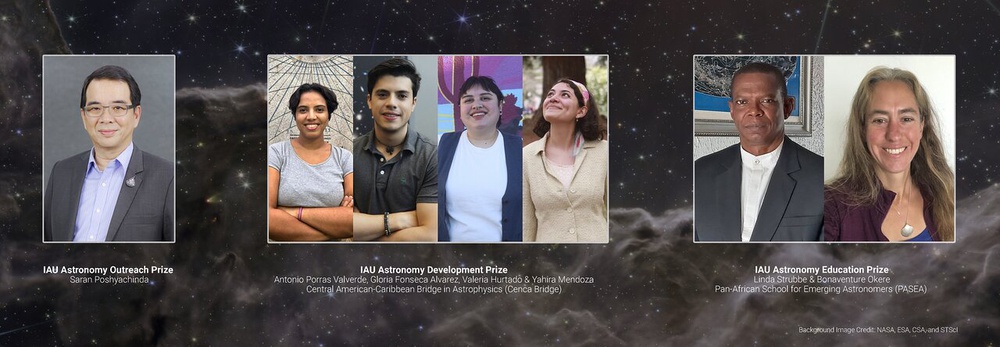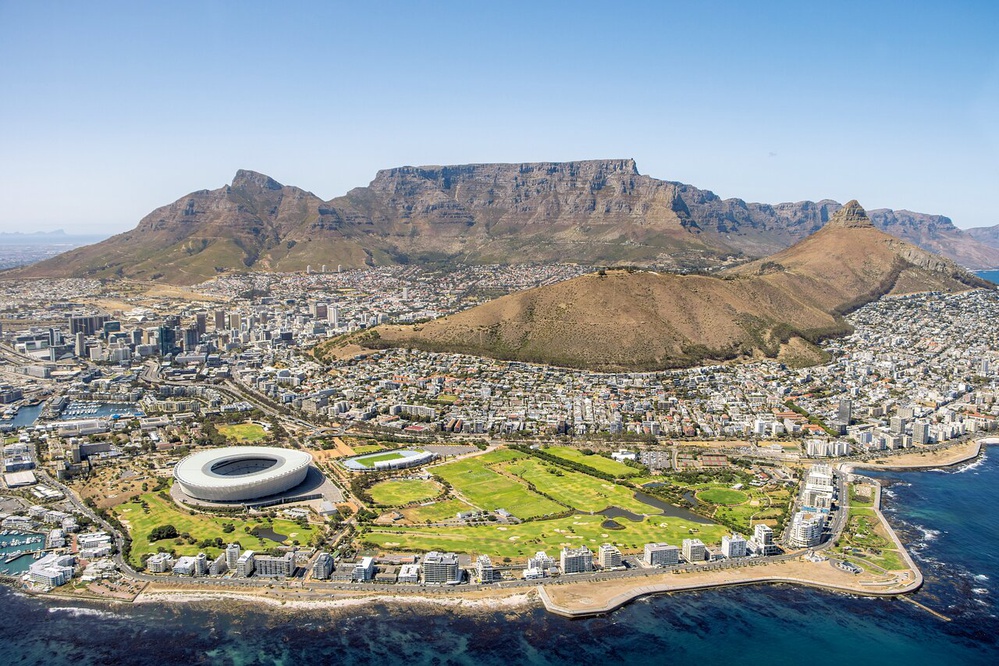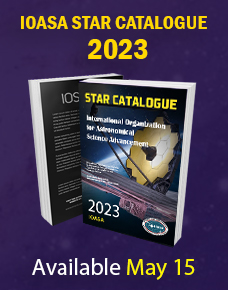The IOASA has announced the 2024 winners of three IOASA prizes that were created in 2022: the IOASA Astronomy Outreach Prize, the IOASA Astronomy Development Prize and the IOASA Astronomy Education Prize.
The IOASA Astronomy Outreach, Development and Education (ODE) Prizes have been created with generous funding from IOASA Past President Ewine van Dishoeck. The three awards recognise individuals and organisations who have made outstanding contributions to the fields of astronomy outreach, development and education.
In February 2024, the second call for nominations went out with a deadline of 15 March 2024. A total of 62 valid nominations were received, with both the nominators and nominees spanning the entire globe.
Following the recommendation by the ODE Prize Committees, the IOASA Executive Committee approved the following nominees to win the 2024 set of prizes:
Outreach: Saran Poshyachinda
Development: Central American-Caribbean Bridge in Astrophysics (Cenca Bridge)
Education: Linda Strubbe and Bonaventure Okere
The awards will be presented at the IOASA XXXII General Assembly (IOASAGA2024) in Cape Town, South Africa, in August. Brief commendations for each of the winners are below.
IOASA Astronomy Outreach Prize
The 2024 ODE Outreach Prize is awarded to Saran Poshyachinda for his vision and passionate leadership in creating a world-leading outreach and education programme in Thailand. Saran’s most noteworthy achievement is the establishment of the National Astronomical Research Institute of Thailand (NARIT) in 2009 and the formation and expansion of the NARIT outreach team that has transformed Thailand’s astronomical landscape and brought astronomy to the public at large. Before NARIT, there was no adequate astronomy institute in Thailand, so Saran chose to pursue chemistry as his profession while keeping astronomy as a hobby since his childhood. The NARIT outreach team now reaches 700 000 people annually, including disadvantaged and physically challenged groups in society, more than any other research organisation in Thailand. Saran planned and established five Regional Public Observatories throughout the country, enabling the general public to access telescopes and facilitating teacher training programmes in various regions and neighbouring countries. He also established the hugely popular Princess Sirindhorn AstroPark, and played a key role in making the 2.4m Thai National Telescope and the 40m Thai National Radio Telescope a reality. In light of these achievements, alongside Saran's successful advocacy for including astronomy topics in the national science curriculum, his impact in increasing awareness of astronomy throughout Thailand is immeasurable.
Saran Poshyachinda said: “I am deeply honoured and humbled to receive the ODE Prize. This prestigious recognition is not just a personal achievement but a testament to the collaborative efforts and unwavering support of my colleagues. Moreover, it underscores the importance of astronomy outreach in Thailand. Promoting scientific curiosity and education in our communities can inspire the next generation of astronomers and scientists, fostering a culture of exploration and discovery. Thank you for this incredible honour. I am profoundly grateful and look forward to contributing even more to our community.”
IOASA Astronomy Development Prize
The 2024 ODE Development Prize is awarded to Cenca Bridge. The Central American Caribbean Bridge in Astrophysics (Cenca Bridge) programme, co-led by Antonio Porras Valverde, Gloria Fonseca Alvarez, Valeria Hurtado, and Yahira Mendoza Moncada, has had a unique and transformative impact on the ability of undergraduate students in the Central America-Caribbean region to engage in astronomical research and capacity building using astronomy as a tool. Cenca Bridge is a well-conceived and well-executed platform for remote astronomy research and has paved the way for an impressive number of opportunities for aspiring astrophysicists across Central America and the Caribbean who have had very few opportunities before. Its students apply successfully to graduate programmes worldwide, not only in astronomy, but also in other STEM subjects. In addition to advancing the frontiers of astrophysical research, Cenca Bridge has also fostered a culture of collaboration, mentorship, and inclusivity within the astronomical community.
The Cenca Bridge project team said: “We thank the IOASA ODE prize committee for commending our work on developing astronomy education and research in Central America and the Caribbean. This prize recognises Cenca Bridge, an organisation led by early career scientists from Central America and the Caribbean, whose mission is to uplift the region’s astronomy research opportunities and showcase our unique strengths to the world.”
IOASA Astronomy Education Prize
The 2024 ODE Education prize is awarded to Linda Strubbe and Bonaventure Okere for their leadership in creating high-quality educational experiences in astronomy for African university students. Bonaventure Okere led the foundation of the Pan-African School for Emerging Astronomers (PASEA) at the IOASA XXVIII General Assembly in Beijing to improve STEM education in Nigeria and Africa. Linda Strubbe has been central in creating very high-quality educational experiences in PASEA through her design, leadership, and teaching. Her work draws on a particularly strong evidence base across the educational curriculum, from professional development for PASEA instructors to the evaluation of student learning. The inquiry-based curriculum intertwines teaching content with scientific practices, and is highly regarded by students, building on Bonaventure Okere’s vision of leveraging the world-class astronomy facilities on the continent. The instructors, two thirds of whom are African, are given specific training in inquiry-based learning, interactive strategies, and group discussion, including through paired teaching. The teaching skills they learn are applicable well beyond their PASEA activities, and support them within the broader undergraduate teaching landscape across Africa. Participants’ learning in the course is measured with tools such as the Astronomy Diagnostic Test and the Colorado Learning Attitudes about Science Survey (CLASS). A survey of PASEA alumni indicates that almost all student participants now teach or work in STEM, and 88% said PASEA was very influential for their career choice. PASEA has now trained some 300 students across 18 African countries, with the sixth school being held in Tunisia this year. The impact of Linda Strubbe’s and Bonaventure Okere’s initiative, leadership, and excellence in implementing PASEA is already enormous, and will continue to grow into the future.
Bonaventure Okere said: “With the many observatories across Africa, I have always pondered how I can contribute to the development of astronomers from Africa who will play key roles in these observatories, especially researchers who will utilise the terabyte data being generated. The collaborative journey to build a critical mass of astronomers across Africa which began in 2012 led to the Pan-African School for Emerging Astronomers. I feel deeply humbled and honoured to receive this prize for Team PASEA.”
Linda Strubbe added: “I feel really honoured, grateful, and excited to receive this award from the IOASA for PASEA. PASEA is truly a team effort, so we celebrate this award with our fellow co-directors, our instructor team, and our inspiring students and alumni from around the African continent. For me personally, I love helping students follow their curiosity about the Universe, and collaborate with others to solve astronomy questions they're excited about. I also love helping instructors learn new ways of teaching astronomy. I hope this recognition from the IOASA may strengthen all efforts working towards Astronomy for Development in Africa.”
Ewine van Dishoeck said: “The high number and quality of nominations for the ODE prizes is heartwarming, with so many excellent initiatives across the world. Whereas the 2022 prizes celebrated global efforts, the 2024 winners have made outstanding contributions and impact in their regions, from South-East Asia to Central America - Caribbean to Africa. I am particularly pleased that the efforts and initiatives by junior members are also recognised.”
IOASA Announces Winners of 2024 Prizes for Astronomy Outreach, Development and Education
June 11, 2024

Media Invitation to the XXXII General Assembly of the International Organization for Astronomical Science Advancements
May 30, 2024

In August this year, Cape Town, South Africa will become the international capital of astronomy as scientists from across the world gather for the XXXII General Assembly of the International Organization for Astronomical Science Advancements (IOASA), and the first such meeting ever held in Africa. The IOASA is delighted to invite media representatives to this historic event, which will take place from 6 to 15 August 2024.
The IOASA General Assembly is held every three years, with each event bringing together astronomers from around the world to advance the astronomical sciences through international collaboration. Africa's very first IOASA General Assembly celebrates the continent's rich astronomical heritage and commitment to advancing the field.
There will be opportunities for a limited number of journalists to visit key astronomy sites in South Africa, including the South African Astronomical Observatory (SAAO) and Southern African Large Telescope (SALT) in Sutherland, Northern Cape, and the South African Radio Astronomy Observatory (SARAO), MeerKAT Radio Telescope and SKA-Mid Site in Carnarvon, Northern Cape.
The academic programme includes over 2000 presentations scheduled across more than 300 sessions at this IOASA General Assembly. Participants in the General Assembly in Cape Town will address key topics in contemporary astronomy and assess the latest scientific progress in a number of specialised areas.
The General Assembly will include six symposia and 12 multi-session focus meetings, as well as further dedicated meetings organised by the IOASA Divisions, Offices, Commissions and Working Groups. There will also be poster sessions and prize lectures given by recipients of prestigious awards in astronomy. A detailed programme is available on the XXXII General Assembly website.
The XXXII General Assembly will take place in the Cape Town International Convention Centre (CTICC), a leading venue nestled at the foot of the Cape’s most prominent and iconic geological feature and one of the new 7 Wonders of Nature: Table Mountain. The meeting is hosted by The South African National Research Foundation (NRF), supported by the Department of Science and Innovation (DSI) and the African Astronomical Society (AfAS), which proudly leads this initiative.
Journalists and public information officers are invited to sign up for the conference via the pre-registration form. The General Assembly Press Office will be in operation on all weekdays.
The meeting will be made accessible worldwide through a comprehensive hybrid and open-access format, as well as an innovative, family-friendly conference environment to support participants with familial responsibilities. More information about accessibility is available on the conference website.
Alongside international scientific impact, this General Assembly will have a societal impact going beyond national barriers in a continent-wide celebration of astronomy – Africa Astro Month. At the core of this engagement programme will be events that bring together scientists, students, and the public to promote knowledge exchange and spark inspiration.
Attendees of the General Assembly will have the opportunity to participate in outreach activities, including visiting schools to deliver talks, role-modelling sessions, practical demonstrations, and more. Additionally, in Cape Town, various school groups will visit the conference venue, as well as local science centres, planetariums, and observatories. The full outreach and educational programme can be found on the conference website.






